8 Spider-Mannerisms Peter Parker Must Carry Into the Marvel Cinematic Universe
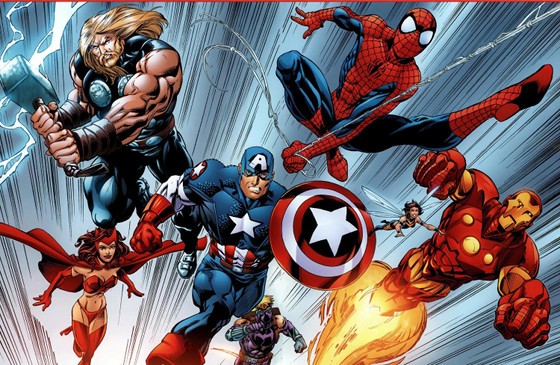 |
Well, the wait is finally over, as it was announced this week that Tom Holland will play our newest friendly neighborhood Spider-Man. We’ve had a couple of bad Spidey films, a couple of great ones and one that sits squarely in the middle, depending on whom you ask. What we have not had, however, is a Spider-Man that totally reflects the many facets of Peter Parker’s storied publication history. Raimi got the core of the character and Webb added some nice nuances, but we’re going to need to dig a little deeper to get the web-slinger we truly deserve.
In honor of his namesake’s eight limbs, here are eight mannerisms or character traits Peter Parker must bring with him on the precarious – and hopefully successful – leap to the MCU.
8. Biting Sarcasm
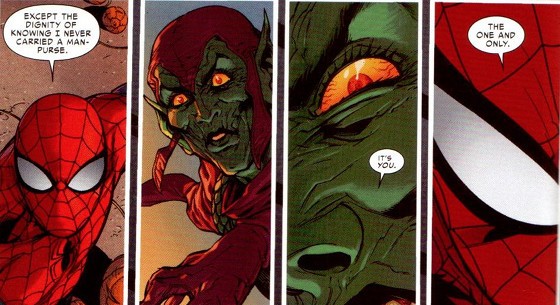 |
The TR community is no stranger to this particular form of amusing cynicism, and, contrary to Tobey Maguire’s raindrops version of the character, neither is Peter Parker. As it turns out, being a bullied science nerd for your entire life can leave one a tad bitter when it comes to the peaks and valleys of high school society.
Give said nerd a neat set of powers that makes him a veritable god among his peers, and he’s not going to go quietly into the night. Now, granted, young master Parker is a good person, and Marvel will obviously keep that inspiring core intact when they introduce him, but he is far from tranquil.
In fact, in the comics, Peter is often portrayed as something of a bully himself when it comes to taking on his extensive rogues gallery, especially when he knows they’re overmatched. You could argue that his constant quipping and somewhat cruel remarks are a clever wrinkle of an obtuse fighting style that he somehow makes work, and you wouldn’t be wrong, but don’t let the funny fa?ade fool you – there is at least an ounce of malice just beneath the surface of Spidey’s colorful mask when he’s in the heat of battle, and it comes through in the form of a constant stream of insults.
This is something Marc Webb and Andrew Garfield brought to their ill-fated Amazing Spider-Man series in spades, and it worked quite well. We’d like to see it preserved and enhanced in the MCU, and it would fit in well with the overall tone of the universe they’ve created thus far.
7. Small Dog Syndrome
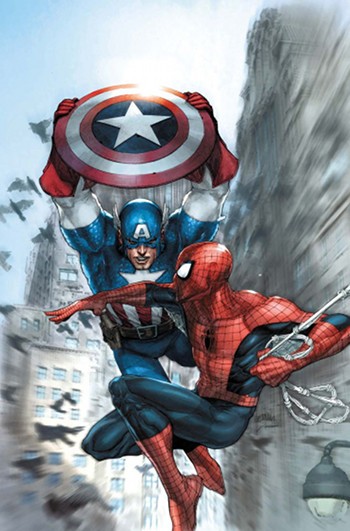 |
Peter Parker and Steve Rogers have little in common in terms of personality, but at their core, there is very little separating them, especially when it comes to standing up for themselves and others that are even weaker.
Now, we’ve been told that we’re getting a Peter Parker who’s already been slinging around New York City in secret, so we won’t get a chance to see his feisty attitude sans powers, but it’s important that Parker be unwilling to let others stand over him, literally or socially. Like many scrawny teens with raging hormones and budding wit, this kid isn’t going to take it lying down, and that could get him into some trouble.
Matter of fact, that’s exactly what Marvel should do – have Spidey talk himself into a fight he can’t win early on in his MCU career. In the comics, he did this with Flash Thompson pre powers, but he could easily do it with an experienced member of the Avengers early into his web-slinging career, and who better to do it against than the aforementioned Steve Rogers?
Spidey tangled with Cap more than once in the Civil War comic arc, and while the MCU version will be different, it may present an even better opportunity for him to be humbled by his elder Avenger. At the peak of his powers, there’s not much standing in the way of a Spider-Man victory over Captain America, no matter how handy the latter is with that shield; however, it’s tough to picture an 18-year old Peter having the poise to punk the super solider.
What do you think Peter’s reaction would be if Cap tried to strong-arm him into a superhuman rebellion?
Either way, it would be fun to watch.
6. Opportunistic Genius
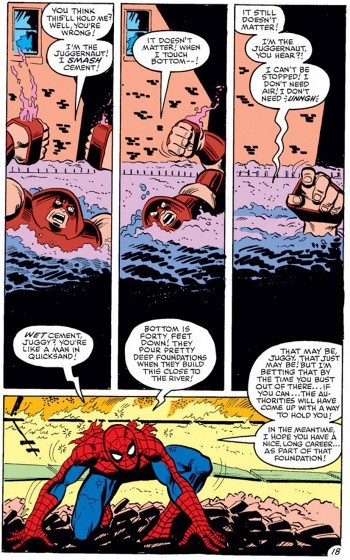 |
We all know Peter Parker is smart, and while he’s rarely been shown to be on the level of a Tony Stark, Bruce Banner or Reed Richards, he’s managed to surprise each member of even that esteemed trinity on occasion.
After all, this is a kid who earned the respect of established super brains such as Norman Osborn, Otto Octavius, Curt Connors and many more before being forced to take them on in super-powered throwdowns; oh, and he usually won said throw downs in no small part by out-witting them.
Admittedly, both the Raimi and Webb versions of the character did demonstrate exceeding levels of intelligence while in Parker form, which is to be applauded. Webb in particular showed Garfield’s Parker to be a dominant force in the science geek realm, whereas Raimi’s Maguire opted for a more old-school, clich?d sort of nerd.
There is nothing wrong with either version; however, it would be nice to see Spidey tap into that genius during combat. Sure, he uses his webs and environment in clever ways in the five films we’ve got, but does that really qualify as genius? How about leading his enemies into complex traps, using high-tech gadgets other than web slingers that are tailored to specific opponents or even using their own powers against them, such as the time when he lured the Juggernaut into a huge pit of semi-hardened cement in a construction zone?
Spidey is strong, but he’s not the strongest; he’s fast, but he’s not the fastest; he’s smart, but he’s not the smartest. It’s only when you combine the three that he becomes one of the most formidable Avengers around, and we want to see him in all his glory.
5. Guilt
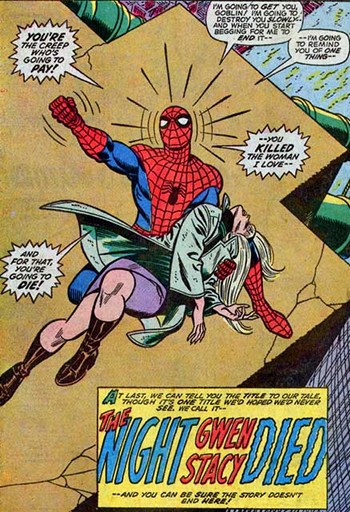 |
Daredevil may feel the guiltiest due to his devout Catholicism, but Spider-Man gives him a run for his money. In addition to holding the death of Uncle Ben up as his first great failing, Peter’s lowest moment came when Gwen Stacy was killed in a seminal conflict with arch nemesis Norman Osborn. Stacy is tossed from the Brooklyn Bridge (or the George Washington Bridge, depending on whether you look at the artwork or read the text) after a tense confrontation, and Spider-Man swings in to save the day.
What makes the death of Gwen Stacy truly tragic is the fact that, while Osborn essentially pulled the trigger, it is by Parker’s hand – or web, more specifically – that she dies. When Spider-Man attempts to catch her, the whiplash is too much for her body to take.
This death was so profoundly sobering in the comic book community that it single-handedly marked the end of the so-called Silver Age of comics, ushering in the grittier, more realistic Bronze Age.
Spider-Man is not a tragic character, per se, but he is one defined by tragedy. The difference between him and many other superheroes, most of whom have tragic origins, is the fact that he has failed loved ones in the line of duty, something he’ll never forget and something that preys on his mind each time he encounters a similar situation.
The Amazing Spider-Man 2 is, in the opinion of many, the worst adaptation of the character ever put to screen; what is heartbreaking about the movie, however, is the fact that this momentous event was wasted in a forced ending that did not fit with the tone of the rest of the film.
We don’t necessarily need to recreate the deaths of Uncle Ben or Gwen Stacy in the MCU iteration of the Spider-Man mythos, but it needs to be clear that the former is why he puts on the mask and the latter is the looming price of failure, no matter how light-hearted the character seems.
4. Never Say Die
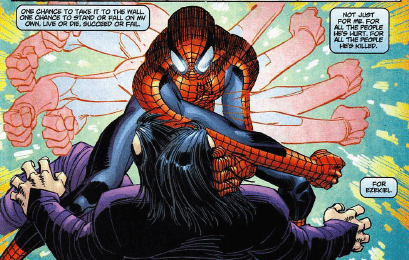 |
Depending on which era you’re reading, Spider-Man can lift anywhere from 10 to 25 tons. He can toss a car through a building, heal at a much faster rate than the average person – though not as fast as Wolverine – and absorb far more punishment. What’s more, Peter Parker’s extraordinary will allows him to push even his superhuman limits past the point where others would, especially when the lives of others are on the line.
Among his many powers-defying feats, Spidey has lifted portions of a building on several occasions, caught an Apache helicopter on a collision course with the street and even dazed the Hulk with physical blows, something few other than Thor have accomplished.
But strength is only a small piece of the equation. In some of his more drawn-out battles – two grueling wars with the villain Morlun, in particular – the wall crawler is forced to fight for literally days against an unstoppable opponent who only grows in power as the fight rolls on. In these instances, we see Spider-Man at his most vulnerable, and by extension, at his most impressive, as he keeps getting up to take his licks, always managing to reach down and call up new levels of power when he is at his lowest points.
Tobey Maguire’s Spidey stopped a train and went into the championship rounds with some heavy hitters and Andrew Garfield’s caught a cop car, but neither of them was put through the wringer to the same degree as we’ve seen in the comics.
The MCU is reportedly never going to take a truly dark turn, and that’s fine, but sometime into the new Spider-Man’s tenure, we need to see him pushed beyond what we think his limits are. We need to see him triumph and nearly die trying, and we want to see the reactions of his fellow Avengers when he does it.
3. Righteous Anger
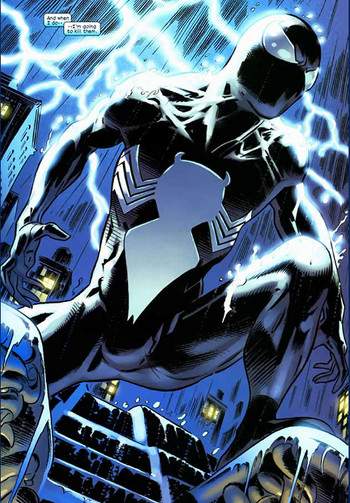 |
As much as we talk about biting sarcasm, bits of cruelty and guilt, Spider-Man is, overall, a fun character. That is precisely what makes rare moments where he crosses long-established personal lines and loses control particularly unsettling, and particularly engrossing.
Peter Parker gets angry, but he never gets murderous on the level of a Frank Castle or even a Matt Murdock. Instead, he maintains a level of truth throughout his baser emotional struggles that still allows us to root for him – essentially, if Spider-Man is angry, you probably did something to deserve whatever pain is coming your way.
No story arc gets this right more so than 2007’s Back in Black, a five-part miniseries directly following the events of Civil War. After revealing his secret identity, Parker puts the lives of his loved ones in danger, and Wilson Fisk, a.k.a. Kingpin takes the opportunity to humble him by contracting a sniper to take a shot at Aunt May.
In his rage, Peter dons a black suit and goes on a maiming spree to locate May’s shooter. His bloody trail eventually brings him into a prison block where Kingpin is housed, and what follows is a one-sided beat down where Spider-Man puts on his best Batman impression in a glorious and somewhat uncomfortable display of righteous revenge, beating Fisk to within an inch of his life with ease.
It’s highly unlikely we’re ever going to get this dark in the MCU, but Spider-Man is an emotional character, and when push comes to shove, he’s going to push back. We want to see that, and we want it to have an impact when we do.
2. Wayward Son
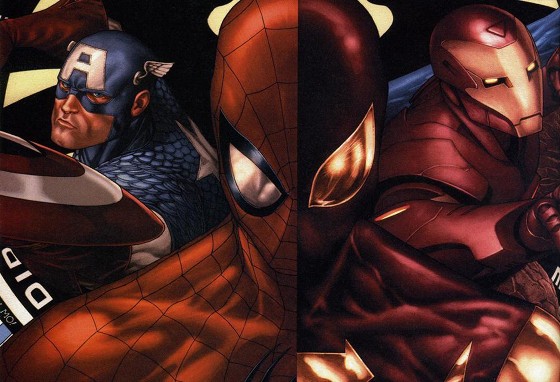 |
Irrespective of publishing house, it is a common trend in superhero origin stories for the protagonist to bemoan the lack of a father figure. Whether through tragedy or, well, pretty much always through tragedy, most of the best superheroes have missing fathers, and they often seek to fill that void with a respected elder, a teacher or someone they can model themselves after.
Spider-Man is no exception. After the mysterious and sort of unexplained-until-way-later circumstances of his comic book roots, Peter’s parents were taken from him and Uncle Ben and Aunt May stepped in to fill the role of caretakers. Where May provided nurturing and unconditional love, Ben provided solidarity and lessons Peter could model himself after, including the one that has been beaten into the dust: with great power comes great responsibility.
When Peter lost Uncle Ben, he didn’t just pull himself up by his bootstraps and carry on – he sought out surrogate fathers. Interestingly, most of these father figures – the aforementioned Osborn, Octavius and Connors among them – eventually turned into his greatest rivals, but that did not lessen their positive impact in his life.
In this capacity above any other, Sam Raimi’s Spider-Man series – at least the first two – excelled, presenting both Osborn and Octavius as genuinely caring, charismatic and even admirable authority figures to Peter. Of course, this only served to make their inevitable falls that much more heart-wrenching for him, but the father parallels don’t stop with Spidey’s rogue’s gallery, following him even into his relationships with other heroes.
Spidey has crossed paths with everyone in the Marvel Universe, and we suspect he’ll cross paths with everyone in the MCU, sooner or later. Since he’s being introduced in Civil War, and since he’s being introduced as such a young and impressionable age, it would be a huge missed opportunity not to position Tony Stark and Steve Rogers as dueling father figures, with Peter representing the soul of the struggle.
We think that’s exactly what they’ll do, but the theme doesn’t have to stop there. This new Spidey is going to be young for a while, and while smart, he’s going to need guidance. Stark has an influence on Peter’s mind, but Rogers knows his heart, and that’s ultimately the relationship that should be explored further.
Which brings us to our final point.
1. Reluctant Leader
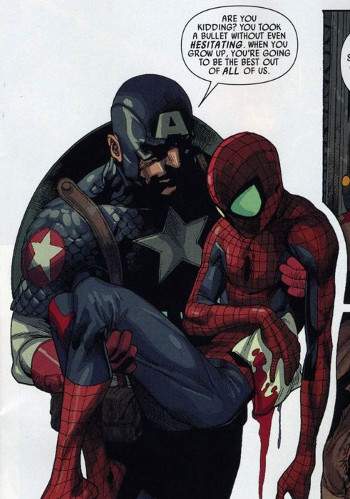 |
Unless something unexpected happens, this Spider-Man is undoubtedly going to be our longest-running iteration of the character, spanning several phases of Marvel movies and possibly – if all goes well – challenging Hugh Jackman for the title of longest-tenured superhero.
This is great news for fans of long-form storytelling, because, while we don’t want to see everything on this list crammed into a trilogy of films, it’s not hard to imagine it all playing out in one form or another over the course of a decade or more.
And while Peter Parker is going to be young, snarky and rough around the edges to kick off his Avenging career, he should eventually be positioned – if not to lead the team – then to be its heart and soul when Steve Rogers turns in his chips and hits the sunset.
In the comics, Spider-Man has found himself an unlikely leader in some of the Avengers worst pinches; although he doesn’t have much faith in himself as a leader, other heroes see him in much rosier light than he sees himself, and Captain America is the founder of that particular fan club.
Rogers has long seen something of himself in Peter, and given his more impressive set of powers and pure core, Spider-Man has more potential than anyone to be the champion the Avengers need when it comes time to face their greatest threats in the absence of the star spangled shield.
Taken as a whole, Spider-Man represents the best Marvel has to offer, and we hope he shines when he crosses over into the MCU.
Previously by Steven Kelliher
“The 9 Greatest Years in the Life of Studio Ghibli”
“8 Fantasy Book Series You Should Check out if You Love Game of Thrones”
“The 10 Best Video Game Cinematic Trailers (for Terrible Games) of All Time”

